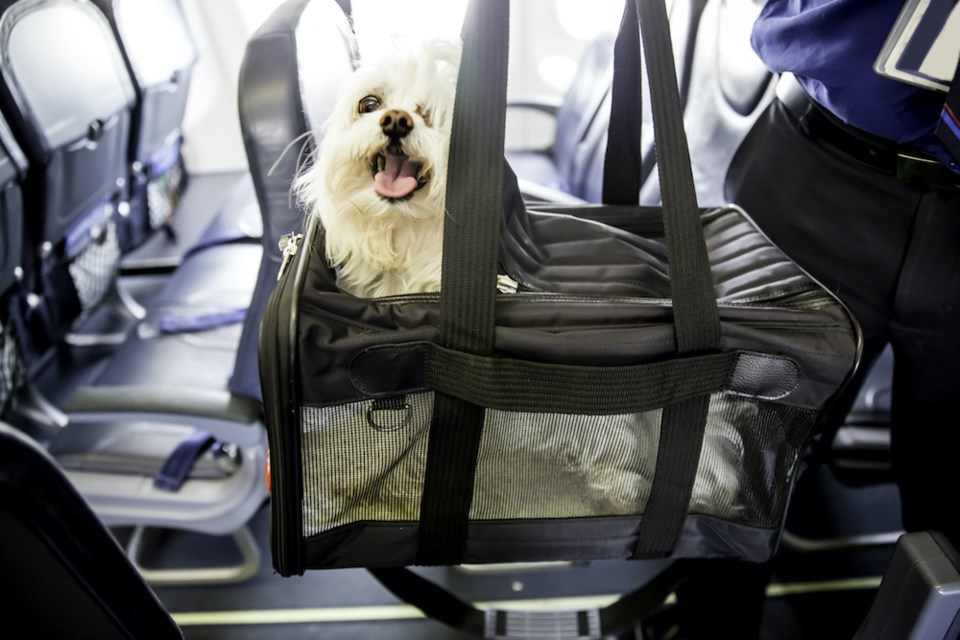The COVD-19 pandemic exacerbated mental health issues including anxiety, depression, and post-traumatic stress disorder. Many people dealt with extreme loneliness, while others experienced relentless trepidation about their health and/or finances.
But our four-legged furry best pals, scaly sidekicks and feathered friends stood fast.
Several first-time pet owners found comfort in a new pet while other people spent extra time at home with their "fur-ever" favourite(s).
But the emotional support derived from a pet may extend beyond simply feeling happier.
'Adverse effect' without her pet
In April 2020, the B.C. Human Rights Tribunal (BCHRT) shared a decision that allowed a 14-year-old girl to keep her dog at home despite the strata bylaw banning residents from having them. The decision noted that she would suffer an "adverse effect" without her beloved pet.
Animal Law Lawyer Victoria Shroff tells Vancouver Is Awesome in an interview that the same logic could be applied to Air Canada's recent decision to ban emotional support animals from the cabin.
Canada's largest airline made the change on March 1 after several major airlines south of the border announced that they would no longer support emotional support animals in the cabin.
According to Shroff, the airline's rationale is that the decision will improve passenger safety and enhance overall comfort on the aircraft. However, service dogs will still be allowed on the aircraft.
"Other airline clients complained that they were injured by someone's emotional support animal, and I'm sure, anytime you have an animal, you can have something happen. Same thing if you have a human who is not behaving well, something can happen," she said.
Emotional support animals are defined as pets that provide emotional or psychiatric care to a person with a "psychological, emotional or mental health difficulty, so that could be something like PTSD, agoraphobia, [and/or] anxiety," Shroff explained. The emotional assistance animals generally do not require specific training.
Currently, there is no provincial certification for emotional support animals in B.C. That said, psychiatric service dogs are trained and certified.
But what if your animal isn't trained but offers you crucial mental health support?
While many people abused the emotional support animal policy on airlines, Shroff said numerous people will struggle to fly without them.
"There's a hierarchy in how dogs are looked at," she explains. "The seeing eye dog is your gold standard for animals that help. You will never see anybody...they will have no legitimacy if they tried to ban a dog from a restaurant, from an aircraft from...a movie theatre. Any place that the person goes, the dogs may go.
"The dog is seen as an extension of the person."
With emotional illness, Shroff said it can difficult to quantify. "When it comes to an emotional illness of any kind — even if it comes under the DSM-5 — the Diagnostic and Statistical Manual that diagnosis psychological and psychiatric illness."
Cats may also be more territorial and more accustomed to staying home, added Shroff. "They may be doing a lot of couch time and helping indoors."
But that doesn't mean our feline friends can't offer someone vital support.
Someone could file a human rights complaint on the basis of a disability under the Canada Human Rights Act, explained Shroff.
Pets in Vancouver rentals
The Provincial Tenancy Act states that a landlord may restrict the size, the type or the number of pets--or simply not allow pets. They may also include reasonable pet-related rules in the tenancy agreement, and they may require a pet damage deposit.
However, there is an exception for guide and service animals. Shroff noted that this exception shows the societal value animals have and how they promote the health, well-being and safety of people and families. She added that pets are considered family members by most people.
"Animals are increasing in importance in our society, not decreasing--and our laws reflect that," she said.
With this in mind, Shroff underscored that a new "one size fits all" pet policy wouldn't work. Some tenants may abuse a more flexible pet policy, which might even affect the well-being of their animals. For example, having too many large animals in a small apartment will not promote a healthy environment for the animals, but it could also affect other tenants in the buildings.



